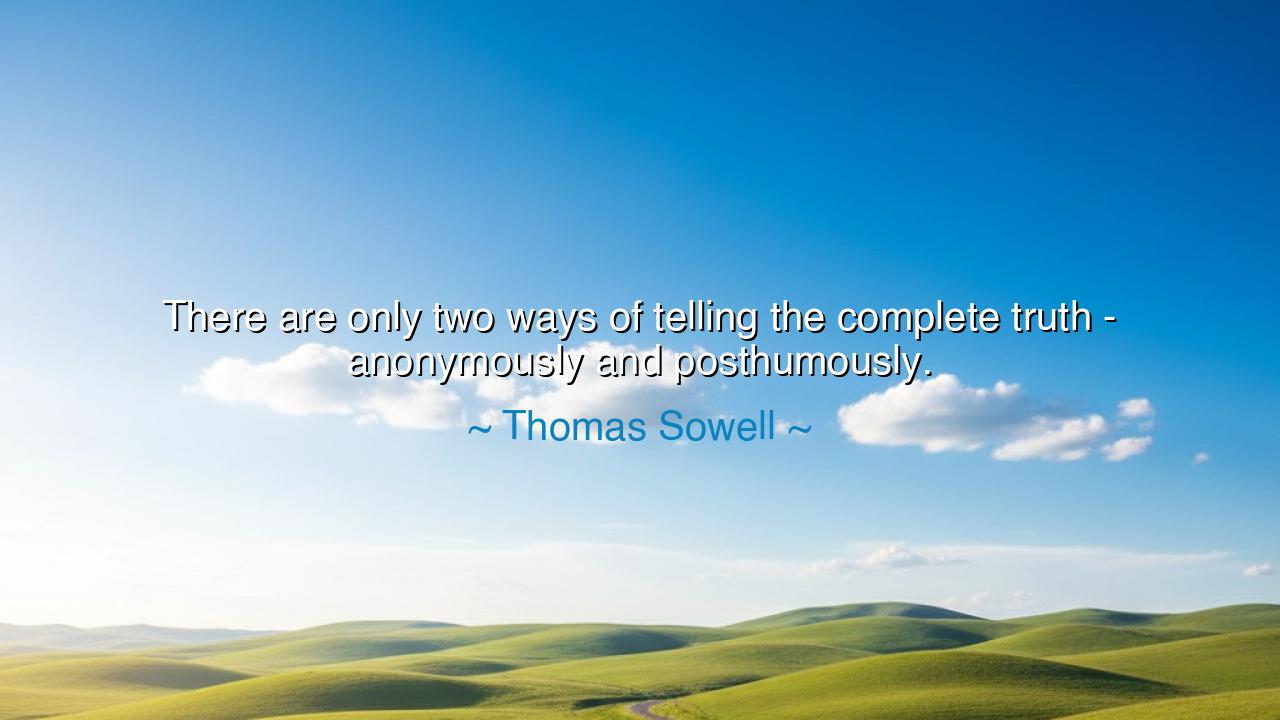
There are only two ways of telling the complete truth -






“There are only two ways of telling the complete truth – anonymously and posthumously.” Thus spoke Thomas Sowell, the sharp-eyed philosopher of economics and society, whose pen often cut through illusions with a surgeon’s precision. His words are not meant to discourage, but to awaken us to a harsh reality: that truth, when spoken in its fullness, often provokes anger, resistance, and even danger. The living man who speaks it openly must face the wrath of those it wounds; but the anonymous voice and the voice from the grave alone escape this burden.
The ancients themselves saw this. When prophets arose to speak uncomfortable truths, they were often scorned, beaten, or killed. Jeremiah was cast into a pit, Socrates made to drink the hemlock, and Christ crucified—each condemned not for falsehood, but for truth spoken without disguise. Sowell’s words remind us that the complete truth—not softened, not disguised, not measured to flatter—carries with it peril. To utter it without fear is to invite hostility; to speak it without consequence often requires the shelter of anonymity or the safety of death.
Consider the life of Niccolò Machiavelli. In his time, he dared to write with brutal honesty about the nature of power, stripping away illusions of virtue in politics. Yet he knew that such truth would brand him a cynic, a corrupter, a schemer. His The Prince circulated quietly, its wisdom scandalous to the noble but enduring to history. His truth survived because it was not shouted openly in the market, but preserved in writing, to be judged long after his own death. In this we see Sowell’s irony: sometimes truth must wait for time itself to be its shield.
Another tale is found in the Federalist Papers of America’s founding. Many of the great architects of liberty—Hamilton, Madison, Jay—wrote under names not their own. Why? Because to speak with honesty about the weaknesses of the Constitution, the dangers of faction, and the frailties of men, was to risk being destroyed before their ideas could take root. Thus they chose the path of anonymity. The truth was told, and it shaped a nation—but it came clothed in secrecy, proving again that unguarded truth is often too dangerous for the living.
Sowell’s words are also a rebuke to the vanity of our age. Many claim to speak truth boldly, but their words are softened to gain applause or sharpened only to wound enemies. Few risk speaking the whole truth, for the whole truth spares no one—not rulers, not institutions, not even ourselves. To speak it fully is to stand alone, stripped of protection. Thus the wise often hide their names, or else consign their truth to writings that will outlive them.
Children of tomorrow, hear this lesson well: if you seek the truth, seek it with humility, and know the cost of proclaiming it. Do not be surprised if the world resists, for the world loves comfort more than honesty. But do not despair either. Truth endures even when the speaker is silenced; it travels through anonymous voices, through hidden writings, through the testimony of the dead. What matters is that it is preserved, so that when the ears of men are ready, it may be heard.
Make it your practice, therefore, to weigh carefully when and how you speak the truth. Speak it when it heals, even if it offends. Preserve it for posterity when the present is too blind to receive it. Share it humbly when your name might distort its reception. For Sowell’s wisdom remains: truth is dangerous, yet eternal; and whether spoken in life or heard after death, it is the only path to freedom. Better to be remembered as one who bore it faithfully, than to be forgotten among those who silenced it for fear.






HCHoang ha chi
Sowell’s statement about the limitations on truth-telling seems to reflect the tension between honesty and self-preservation. If we cannot speak the truth without hiding behind anonymity or waiting until after our death, does that imply we are living in a society that punishes truth? What steps can we take to encourage a culture where speaking the truth is not only possible but also celebrated, regardless of the consequences?
KDKhoa Duy
This quote suggests that truth can be so disruptive that it only survives in the form of anonymity or after death. Is this view overly cynical, or is there some truth to the idea that society often suppresses uncomfortable realities? How can we as individuals and communities create spaces where truth is accepted and valued, even when it challenges existing power structures or norms?
DPDung Pham
Sowell’s quote raises a provocative point about the nature of truth and the risks involved in speaking it. But does this mean that the truth is inherently dangerous, or is it the societal reaction to truth that causes the issue? Are we limiting ourselves by only being able to express truth anonymously or posthumously, or is there a way to change this dynamic so that truth-telling is valued and protected?
CLDoan Cong Loc
This quote highlights the idea that speaking the complete truth may require hiding one's identity or waiting until after one’s death. Is this a comment on how society handles truth? If honesty is so dangerous that it needs to be anonymous or posthumous, what does that say about the values of our culture? How do we navigate situations where telling the truth might cost us something significant, like our reputation or safety?
NNNga nga
Thomas Sowell’s quote makes me reflect on how difficult it is to speak the full truth, especially in a world where honesty can be punished. If truth is often constrained by fear of repercussions, can we truly express it freely? Is anonymity or posthumous recognition the only safe ways to speak the unvarnished truth, or are there other avenues where truth can be spoken without fear of retaliation?